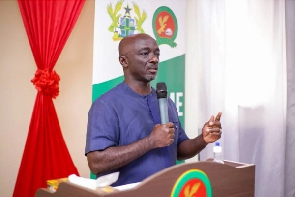 Ambassador Edward Boateng, Director General of SIGA
Ambassador Edward Boateng, Director General of SIGA
The impending Domestic Debt Exchange Programme (DDEP) has reignited calls for reforms, including capping salaries of management and staff at State Owned Enterprises (SOEs).
The DDEP is occasioned by a high debt stock coupled with comparatively low revenue. Typically, SOEs are supposed to make profit and pay dividends to the state; however, they have proven to be black-holes for public funds – gulping in billions of state support with nothing to show for it; a situation that many economists say has contributed to the current tight public fiscal space.
For instance, at the end of 2020 government’s total exposure to the SOEs stood at GH¢21.53billion, according to the State Ownership Report published by the State Interests and Governance Authority (SIGA).
The report further indicated that government’s exposure consisted of GH¢1.48billion in subventions, GH¢14.74billion in loans that have been re-lent, and GH¢2.38billion in outstanding government-backed guarantees. Additionally, there were GH¢138.99million in contingent liabilities from ongoing Public-Private Partnership (PPP) projects.
An additional component of GH¢2.79billion was in the form of government support and bailouts to some SOEs to counteract the adverse effects of COVID-19 during the pandemic’s peak.
Against this backdrop, the Bank of Ghana (BoG) Governor, Dr. Ernest Addsion, in a commentary about the role that SOEs’ performance must play on the path of national economic recovery and stability said: “It is important that SOEs are competitive and efficient, and it is expected that we will have a policy that states clearly the objectives and guiding principles of state ownership”.
He also noted that such a policy should clearly outline the roles and responsibilities of the shareholders or management of state-owned enterprises (SOEs), as well as the fiscal relations between government and SOEs – including financing and dividend payments.
“The policy should also specify what the fiscal relations between government and SOEs are, including the financing of SOEs and dividend payments,” he said.
Dr. Addison added that the policy should provide a framework for the remuneration of board members and executive management of SOEs based on their technical competence, and a cap must be placed on salary adjustments for SOEs.
“All of these were part of the issues discussed under the IMF programme,” the central bank’s chief pointed out.
Meanwhile, a report by the Africa Centre for Energy Policy (ACEP) revealed that energy sector SOEs suffered losses of GH¢3.7billion in 2018, GH¢2.9billion in 2019 and GH¢2.5billion in 2020, with the Electricity Company of Ghana (ECG), Tema Oil Refinery, Valco and Northern Electricity Distribution Company (NEDCo) being among the largest contributors to those losses during the period.
With the exception of ECG, the other entities recorded negative profits continuously throughout the specified time-frame.
Poor governance
Despite repeated assurances that a decent number of SOEs will be listed on the Ghana Stock Exchange (GSE) – a move which its promoters say will allow for fresh funding and ostensibly guarantee better governance practices – state entities continue to fail, especially with their governance.
At the end of 2022, Minister for Public Enterprises Joseph Cudjoe indicated that approximately 60 percent of the 128 state agencies have never produced audited reports reliable enough to assess their performances.
This has happened even as concerns over unclear key performance indices and the seeming failure to penalise poor performance persist.